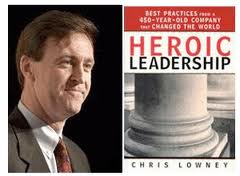 “(Newly minted Jesuit saint Peter ) Faber’s vision of the positive role of business is remarkable. He wrote two centuries before Adam Smith lifted a pen, during an era when the Catholic church generally looked askance at business. Yet in a few short phrases, Faber crystallizes a profound and profoundly challenging philosophy of business.” writes Chris Lowney, a former managing director of J.P. Morgan & Co. in the NCR…
“(Newly minted Jesuit saint Peter ) Faber’s vision of the positive role of business is remarkable. He wrote two centuries before Adam Smith lifted a pen, during an era when the Catholic church generally looked askance at business. Yet in a few short phrases, Faber crystallizes a profound and profoundly challenging philosophy of business.” writes Chris Lowney, a former managing director of J.P. Morgan & Co. in the NCR…
Second, Faber recognizes that great businesspeople have a “flair.” The imagination to identify unmet needs, the willingness to try something new and bear the risk of failure, the scrupulous attention to detailed execution, the ability to inspire team members, and a hundred other things all mark the flair of good business people. These are talents, gifts from God, and ought to be recognized as such. It is not a sin to succeed in business by employing these talents fully.
But Faber implicitly challenges businesspeople that their talents are only being used well when they maintain a proper perspective on life. Business and money-making are not the highest ends: “If there were not such a harvest of souls to reaped,” Faber writes. Our destiny lies beyond this world, and we’re here for purposes beyond what we can sell, trade, build, buy, flaunt or own during this short earthly sojourn. That includes, if we are businesspeople, remaining aware that our every business decision impacts, for better or ill, the lives of employees, customers, shareholders and communities.
Faber’s vision of business is an ennobling, inspiring one. Entrepreneurs with a Faber-style flair for business don’t think only of “enhancing shareholder value” and making themselves hog-whimperingly rich; they hop out of bed each morning feeling blessed to help fellow citizens use their talents, support their families in a highly dignified way, and alleviate poverty in their communities.
Francis’ apostolic exhortation, Evangelii Gaudium, also has plenty to say about the role of business, launching salvos, for example, at a business culture that sometimes turns money into a modern-day golden calf. Catholics and pundits more generally have rushed to react with predictable party-line tropes. Republican Catholics tsk-tsk that the pope really doesn’t understand how markets work; Democratic Catholics reduce the pope’s agenda to nothing more than an endorsement for more aggressively redistributionist tax policies. But a close read of his exhortation reveals challenges and affirmations for all Catholic parties and tribes in this debate.
In fact, the pope, like Faber, is calling businesspeople and all of us to ponder our human vocation in much more fundamental ways. After all, that’s what great leaders do, whether popes or entrepreneurs with a flair for business. They try to inspire us to transcend our ideologies and differences and coalesce around a higher viewpoint.
[Chris Lowney, author of Pope Francis: Why He Leads the Way He Leads (Loyola Press), was formerly a managing director of J.P. Morgan & Co. and now chairs the board of Catholic Health Initiatives, one of the nation’s largest health care/hospital systems.]
Tags: Business, Patron

